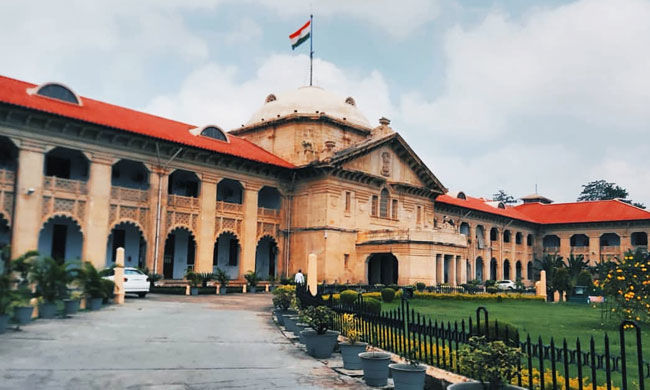The Allahabad High Court has summoned a senior judicial officer for allegedly discriminating against Muslim lawyers on the basis of religion.
The order was passed by the single-judge Bench of Justice Shamim Ahmed last month against
Additional District & Sessions Judge (Special Judge NIA/ATS, Lucknow) Vivekanand Sharan Tripathi.
The High Court observed that in view of the discussions/observations and after perusal of the orders passed by the trial court, it failed to understand the basis and legal aspects on which the findings of the impugned orders were placed by the trial court.
The single-judge Bench further took note of the fact that the trial court, while passing the impugned orders, made certain observations regarding a particular community, which showed judicial misconduct.
As per the case, the trial court was hearing a criminal case against two Muslim clerics – Mohammad Umar Gautam and Mufti Qazi Jahangir Alam Qasmi and others, who were accused of forced religious conversion by the Anti-Terrorist Squad of Uttar Pradesh.
In January this year, the Special Judge appointed amici curiae as additional counsel to assist the Court after turning down certain Muslim lawyers’ request for a brief adjournment to enable them to attend Friday prayers. The trial judge had ordered that the amici curiae would represent the accused whenever the Muslim lawyers would go to attend prayers.
Justice Ahmed had last month stayed the orders passed by the trial court after one of the accused moved the High Court.
Following the High Court order, the trial court had allowed the Muslim lawyers to represent the accused, however, it did not decide the application for electronic evidence.
In the order dated April 3, the single-judge took a strong objection to the trial court’s conduct and said the judge had failed to understand the gravity of the stay order and proceeded in a very arbitrary manner.
It observed that unless and until the copy of the electronic evidence demanded by the applicant vide his application dated January 19, 2024 under Section 207 CrPC was not provided to the applicant, the trial court ought not to have proceeded with trial of the case, or must have given some observation in this regard but the trial court was silent.
The High Court further noted the trial judge’s observations with regard to the ‘non presence’ of counsel for the applicant during the trial as they belonged to a ‘certain religion’ and the consequent appointment of amici.
It saud this showed clear discrimination on part of the trial court on the basis of religion, which was clear violation of fundamental right enshrined in Article 15 of the Constitution of India.
The single-judge Bench, while noting that if there were other grounds they ought to have been stated in the order by the trial court said that it can be clearly inferred that the trial court had passed the order which was directly contrary to the terms of Article 15(1) as violating a specific constitutional prohibition.
The learned Judge of the trial court has clearly discriminated one community only on the basis of religion, it added.
The single-judge Bench noted that judges committing misconduct by engaging in personal behaviour called their judicial integrity into question.
It observed that a Judge, like Caesar’s wife, must be above suspicion. The credibility of the judicial system was dependent upon the Judges who manned it. For a democracy to thrive and the rule of law to survive, justice system and the judicial process have to be strong and every Judge must discharge his judicial functions with integrity, impartiality and intellectual honesty.
There can be no manner of doubt that a Judge must decide the case only on the basis of the facts on record and the law applicable to the case. If a Judge was deciding a case for any extraneous reasons then he was not performing his duty in accordance with law, added the High Court.
The single-judge Bench, while continuing with its earlier stay order, further restrained the trial court from proceeding further with the trial against the petitioner.
It further summoned the judicial officer for an explanation regarding the orders in question.
Stating that the observations made by the trial court judge showed judicial misconduct, the High Court noted that it broke down the very fibre of what was necessary for a functional judiciary-citizens, who believed their judges were fair and impartial.
It said the judiciary cannot exist without the trust and confidence of people. Judges must, therefore, be accountable to legal and ethical standards. In holding them accountable for their behavior, judicial conduct review must be performed without invading the independence of judicial decision-making, it added.
Judge Tripathi appeared before the single-judge Bench on Monday and tendered an unconditional apology. He said that he had passed the orders under misconception and will remain cautious in future.
After his counsel sought some time to file a personal affidavit, the Court granted him two days and listed the matter for further hearing on April 18.
The petitioner was represented by Advocates Mohemmed Amir Naqvi, Abhishek Singh, Ajeet Pratap Singh and Zia Ul Qayuim.
Advocate Gaurav Mehrotra appeared for Judge Vivekanand Sharan Tripathi, while Advocate Shiv Nath Tilhari represented the State.


